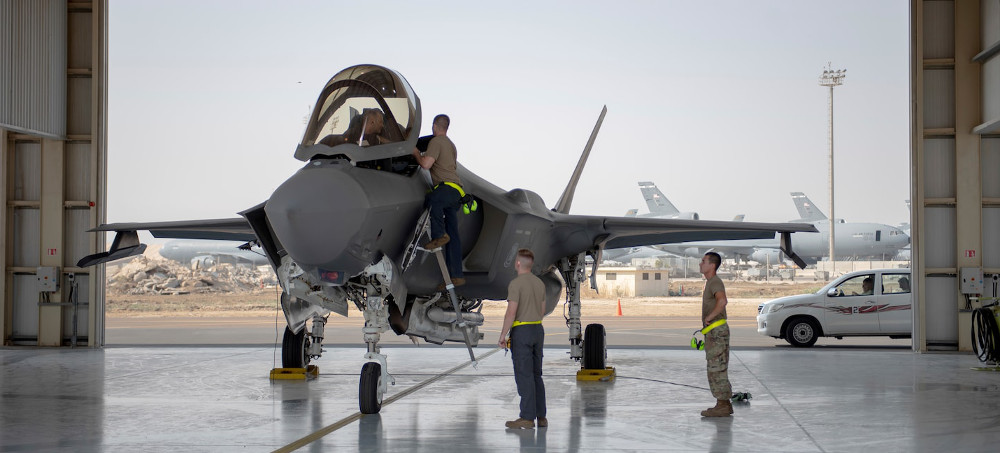Biden Is Doubling Down on Trump's Mistake of Arms Deals With This Rogue Regime
Mohamad Bazzi The Washington Post An F-35 fighter jet pilot and crew prepare for a mission at Al-Dhafra Air Base in the United Arab Emirates on Aug. 5, 2019. (photo: AP)
An F-35 fighter jet pilot and crew prepare for a mission at Al-Dhafra Air Base in the United Arab Emirates on Aug. 5, 2019. (photo: AP) Biden Is Doubling Down on Trump's Mistake of Arms Deals With This Rogue Regime
Mohamad Bazzi The Washington PostBiden’s decision dashed hopes that he would change the U.S. relationship with autocratic allies and live up to his lofty rhetoric that human rights would be at the center of his foreign policy. The weapons sales also underscored how the Abraham Accords — a series of agreements signed last year for Arab states to normalize relations with Israel — were built on a contradiction: Then-President Donald Trump offered most of the countries involved substantial arms deals that will ultimately make the Middle East less safe and stable.
The Biden administration should reconsider the sales, under a new proposal it is reportedly developing that would condition weapons sales to a country’s human rights record. The UAE has an abysmal history of supporting conflict in the region, especially over the past decade. Until it withdrew most of its ground troops in 2019, the UAE was the main partner of the Saudi-led war in Yemen, which has killed an estimated 233,000 people and instigated one of the world’s worst humanitarian disasters. Even after the withdrawal, the UAE continued providing weapons and support to abusive local militias in Yemen.
The UAE has also carried out airstrikes and drone attacks in Libya, and provided weapons to Libyan forces led by Khalifa Hifter, in violation of a U.N. arms embargo. A report by U.N. experts issued in December 2019 found that the UAE “routinely and sometimes blatantly supplied weapons” to its Libyan allies, including drones, air defense systems and armored vehicles.
Moreover, the UAE has been at the center of two recent scandals that harm U.S. interests. Some of the UAE’s most senior leaders, including de facto ruler and Abu Dhabi crown prince Mohammed bin Zayed (known as MBZ), were invoked in the indictment of former Trump fundraiser Thomas Barrack. He was arrested in July on charges of failing to register as a foreign lobbyist, obstruction of justice and lying to investigators. At the UAE’s behest, according to prosecutors, Barrack tried to persuade Trump and his advisers to weaken the U.S. relationship with the UAE’s rival, Qatar, which is home to the largest American military base in the Middle East. That base — and the Qatari government’s role as an intermediary with the Taliban — turned out to be critical to the U.S. evacuation effort from Afghanistan.
The UAE was also one of the authoritarian countries that deployed the Pegasus software developed by Israeli firm NSO Group to reportedly spy on dissidents, journalists, political opponents and Western officials. The UAE’s leaders used record oil revenue in the early 2000s to improve their image with the West, building branches of museums such as the Louvre and Guggenheim, opening Western university campuses and funding literary festivals. But after the Arab Spring uprisings in 2011, they became worried about their own ability to stay in power and turned more repressive.
The UAE began a crackdown on internal dissent, arresting dozens of government critics. It scaled back meager freedoms and worked to undermine Islamist movements throughout the region, especially the Muslim Brotherhood in Egypt. It also built its own sophisticated hacking and cyberwarfare operation, using former U.S. intelligence officials. On Sept. 14, the Justice Department announced that three former U.S. operatives had admitted to hacking crimes and providing the UAE with advanced technology while they worked for DarkMatter, a company linked to the UAE government.
The Biden administration should not reward the UAE’s destabilizing activities, aggressive foreign policy and internal repression with a massive sale of dozens of F-35 fighter jets, long-range armed drones and $10 billion worth of missiles and bombs. More broadly, the large-scale weapons deal sends the wrong message to the Middle East and the world. The highly touted Abraham Accords that supposedly broke a decades-long bottleneck in Arab-Israeli peacemaking have turned into an arms bonanza.
One day after announcing a normalization deal between Israel and Morocco, the Trump administration notified Congress of its plans to sell $1 billion in sophisticated drones and missiles to Morocco. As he prepared to sign the Abraham Accords at the White House last year, then-Israeli Prime Minister Benjamin Netanyahu came with his own weapons wish list: $8 billion in new F-35s, V-22 Osprey aircraft and Apache attack helicopters. It’s unclear how far along the Israeli request is in the approval process, but after clearing the UAE’s massive deal, the Biden administration will have a hard time rejecting other sales.
Biden missed the chance to fix one of his predecessors’ final mistakes: turning the normalization agreements between Israel and Arab countries into an arms race that could fuel new conflicts in the Middle East. If Biden continues down this path, he will be complicit in a fresh wave of regional instability and bloodshed.
